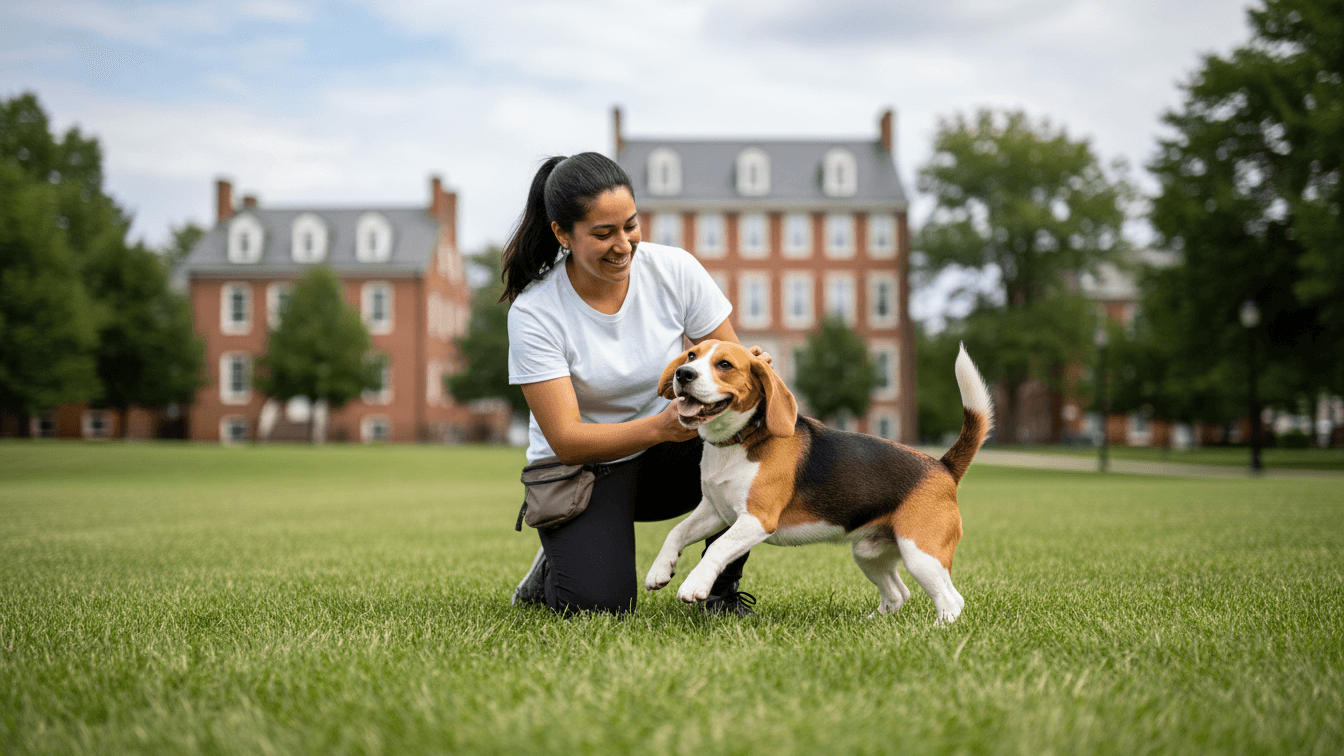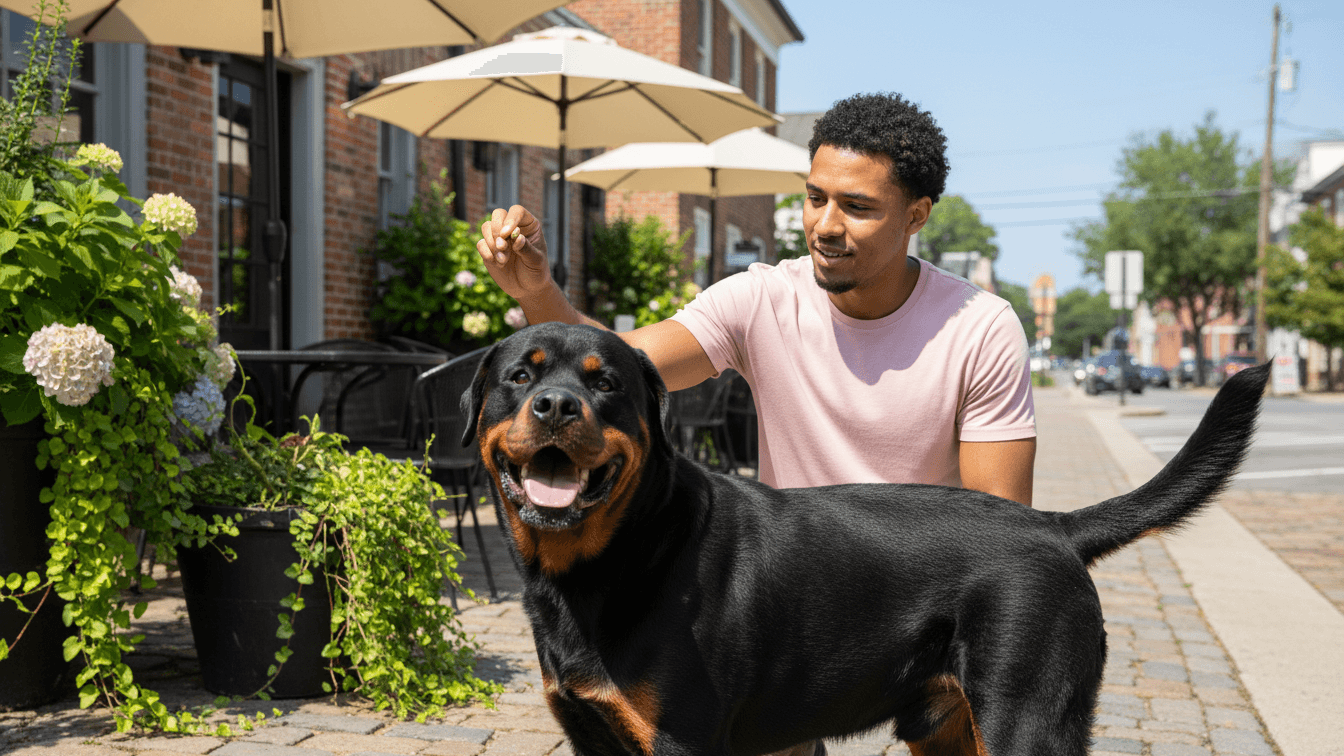Your Complete Guide to Choosing a Dog Trainer in Delaware and Surrounding Areas
Delaware is a small state, but it offers big opportunities for dog owners looking to build a calm, well-behaved companion. From the busy streets of Wilmington to the beaches along Rehoboth and the quieter suburbs in Dover, your dog needs solid obedience skills to handle everything from crowded boardwalks to local farmer’s markets.
Most dog owners here deal with leash pulling on popular trails, reactivity around other dogs at state parks, and basic manners at outdoor dining spots. Finding the right professional dog trainer means working with someone who understands Delaware’s specific regulations and lifestyle.
How to Choose the Right Trainer
Look for a trainer who focuses on positive reinforcement training and understands the unique demands of Delaware life. Your dog should be comfortable walking through downtown areas, staying polite near wildlife at state parks, and handling summer crowds without stress.
Start by checking for recognized credentials like CPDT-KA, KPA-CTP, or CBCC-KA for serious behavior cases. These certifications show that a trainer has passed rigorous exams and follows humane, science-based methods.
If your dog struggles with fear, aggression, or reactivity, ask whether the trainer has experience with behavior modification and whether they collaborate with local veterinarians when needed. Some cases benefit from working with an IAABC-CDBC or similar specialist.
Private lessons and in-home dog training work best for household issues like door manners, counter-surfing, or jumping on guests. Group classes make sense once your dog can focus around distractions, and they’re great for practicing polite greetings and calm behavior.
Board and train programs can speed up results if you’re short on time, but make sure the facility is clean, transparent about methods, and offers thorough handoff sessions so you can maintain the progress at home.
Common Dog Training Methods Explained

Reward-based training builds trust while teaching your dog to make good choices in real-world situations. This approach aligns with Delaware’s animal welfare standards and helps you avoid complaints from neighbors or problems in public spaces.
Basic obedience covers sit, down, stay, recall, and leash training so your dog can handle walks, park visits, and trips to pet-friendly shops without pulling or lunging. These skills form the foundation for everything else.
Puppy training focuses on early socialization, potty training, crate comfort, bite inhibition, and gentle leash manners. Starting young prevents bad habits from taking root and makes life easier as your puppy grows.
Behavior modification addresses issues like separation anxiety, reactivity, resource guarding, and fear through careful desensitization and counterconditioning. This work takes patience and consistency, but it creates lasting change.
Dog training classes offer structured learning in a group setting, which helps your dog practice good manners around other dogs and people. The best classes keep group sizes small, screen participants carefully, and emphasize calmness over excitement.
Specialized programs like service dog training or therapy dog training require extra structure, public-access skills, and a clear step-by-step training program. These paths demand higher standards and more extensive socialization.
Avoid trainers who rely on fear, intimidation, or pain-based tools. Humane methods are safer, more effective long-term, and better for maintaining good relationships with your neighbors and community.
Average Cost of Dog Training in Delaware and Surrounding Areas (Updated for 2025)
Pricing across Delaware varies based on the trainer’s experience, session length, and location. Trainers in Wilmington and northern New Castle County typically charge slightly more than those in Kent or Sussex counties. Here’s what most Delaware dog owners are paying in 2025.
| Service Type | Average Cost (Delaware) |
|---|---|
| Puppy classes (4-6 weeks) | $140-$250 total |
| Group obedience classes (4-6 weeks) | $150-$280 total |
| Private lessons (60-90 min) | $100-$175 per session |
| In-home coaching packages (4-6 visits) | $400-$850 total |
| Day training (trainer works your dog + handoff) | $400-$900 per week |
| Behavior consult for reactivity/anxiety (initial) | $140-$240 |
| Board and train (2-4 weeks) | $1,800-$4,200 total |
Expect to pay extra for travel if you live in rural areas or if the trainer needs to drive more than 20 minutes. Behavior work involving aggression or severe anxiety often costs more due to the expertise required.
Ask about what’s included in each package, how progress is tracked, and whether the trainer offers a free consultation or free evaluation before you commit.
Questions to Ask a Potential Dog Trainer
- What training methods do you use, and how do you keep sessions positive and low-stress for my dog?
- What credentials do you hold, like CPDT-KSA or KPA-CTP? Do you participate in continuing education?
- How will you customize the training program for my dog’s specific needs and our Delaware lifestyle?
- Do you offer in-home dog training, group classes, or day training, and which approach fits my goals best?
- How will we measure progress and know when to increase distractions or difficulty?
- What are the total costs, including travel fees, and what’s your cancellation policy?
- Do you carry liability insurance, and can you provide proof?
- For behavior problems, will you work with my veterinarian or a veterinary behaviorist if needed?
- What should I practice between training sessions to help my dog keep improving?
Local Delaware Rules and Considerations
Delaware enforces leash laws, vaccination requirements, and nuisance ordinances to keep communities safe for everyone. Each county and municipality may have additional rules, so it’s worth checking with your local government.
Leash laws apply statewide in public spaces, including parks, beaches, and trails. Dogs must be on a leash no longer than six feet unless you’re inside a designated off-leash area. This rule helps prevent conflicts with other dogs, wildlife, and people.
Delaware requires current rabies vaccination for all dogs over three months old, per Title 16, Chapter 27 of the Delaware Code. Your dog should wear a rabies tag on their collar at all times, and you can get vaccinations through your veterinarian or low-cost clinics.
Excessive barking can be reported as a noise nuisance, which can lead to fines or other legal issues. Work with your trainer on alert barking, separation anxiety, and boredom-related behaviors before complaints arise.
Professional dog trainers operating in public spaces may need permits or proof of liability insurance, especially if they use state parks or municipal facilities for training sessions. Check with the Delaware Division of Parks and Recreation if you’re planning to use state property.
Delaware doesn’t require specific licenses for dog trainers, but trainers who board dogs as part of their services must comply with state animal welfare regulations. The Delaware Office of Animal Welfare oversees facilities that house animals for profit.
Local Delaware Resources for Dog Owners
These locations give you excellent opportunities to practice obedience training, work on socialization, and provide enrichment for your dog. Always follow posted rules and practice good dog park etiquette.
- Carousel Park and Equestrian Center in Wilmington has a popular fenced dog park with separate areas for large and small dogs, making it ideal for practicing recalls and polite greetings.
- Brandywine Park in Wilmington welcomes leashed dogs along its walking trails, offering a quieter setting for leash training and impulse control.
- Lums Pond State Park in Bear features miles of trails where leashed dogs can practice focus around hikers, cyclists, and wildlife.
- Cape Henlopen State Park near Lewes allows leashed dogs on trails and certain beach areas during off-season months, perfect for building calm behavior around distractions.

FAQs
How much does in-home dog training cost in Delaware?
Most Delaware trainers charge $100-$175 per in-home visit, with package discounts available when you book multiple sessions. Behavior issues like reactivity or aggression typically start at the higher end of that range.
Is in-home dog training worth it?
Yes, because you’re working on problems exactly where they happen. Your trainer can address door manners, jumping on guests, counter-surfing, and yard reactivity right at home, then step outside to practice leash skills on your actual neighborhood sidewalks.
Can you pay someone to house train your dog?
Absolutely. Many trainers offer puppy training programs that include potty training, crate routines, and daily schedules. Day training can speed up the process while teaching you how to maintain the progress after the trainer leaves.
What is the 3-3-3 rule for dog training?
This helpful guideline suggests that new or adopted dogs need about 3 days to decompress, 3 weeks to learn your routines, and 3 months to feel completely settled. Good training programs work with this natural adjustment period rather than rushing the process.
How long will it take to reach my training goals?
Most friendly puppies and adult dogs show solid progress within 4-8 weeks if you practice daily between training sessions. Fear, reactivity, or aggression typically requires several months of careful behavior modification with gradual increases in difficulty.
What should I bring to group classes?
Pack a flat collar or harness, a 6-foot leash, high-value treats, water, and current vaccination records if your trainer requests them. Leave retractable leashes at home for safety reasons.
What’s the leash law in Delaware?
Delaware law requires dogs to be on a leash no longer than six feet in all public spaces, except inside designated off-leash dog parks. This statewide rule applies to beaches, trails, parks, and downtown areas.
Do I need a dog license in Delaware?
Delaware doesn’t require statewide dog licenses, but some municipalities like Wilmington have their own licensing requirements. Contact your local government office to confirm. Rabies vaccination is mandatory statewide.
What shots does my dog need in Delaware?
Delaware requires rabies vaccination for all dogs over three months old. Your veterinarian may also recommend distemper-parvo, bordetella, leptospirosis, and Lyme disease vaccines based on your dog’s lifestyle and exposure risks.
Are dog trainers required to be licensed in Delaware?
No special licenses exist for dog trainers in Delaware. However, trainers who board dogs as part of their services must comply with state animal welfare regulations through the Delaware Office of Animal Welfare.
Where can I practice off-leash recall in Delaware?
Use fenced dog parks like Carousel Park in Wilmington or Barksdale Dog Park in Newark to keep things safe and legal. Try visiting during quieter hours when you’re starting out.
Which dog parks allow training around Delaware?
Carousel Park and Equestrian Center in Wilmington, Barksdale Dog Park in Newark, and Canby Park Dog Park in Wilmington all offer fenced areas where you can practice recalls and polite greetings. Always follow posted rules and be respectful of other users.
What beaches or trails allow dogs for training?
Cape Henlopen State Park allows leashed dogs on trails year-round and on certain beach areas during off-season months. Lums Pond State Park and Brandywine Creek State Park both welcome leashed dogs on their trails. Delaware Seashore State Park allows leashed dogs on beaches during off-season, giving you great opportunities to practice calm behavior around ocean waves, birds, and other distractions.
How do I find expert dog trainers in Delaware?
Look for trainers with recognized dog trainer certifications and ask about their experience with your specific training goals. Check reviews, ask for references, and schedule a free evaluation to see if the trainer is a good fit for you and your dog.
What should I do if my dog is reactive on Delaware trails?
Work with a certified dog trainer who specializes in behavior modification. Start training sessions in low-distraction environments, then gradually build up to busier trails like those at Brandywine Park or Lums Pond. Use high-value treats and focus on building distance from triggers while rewarding calm behavior.
The right combination of humane training methods, consistent practice, and knowledge of Delaware’s local rules will help your dog become a confident companion. Whether you’re walking through downtown Wilmington, exploring state parks, or enjoying the beach during off-season, your investment in professional dog training pays off in a well-behaved dog who’s welcome everywhere you go.
